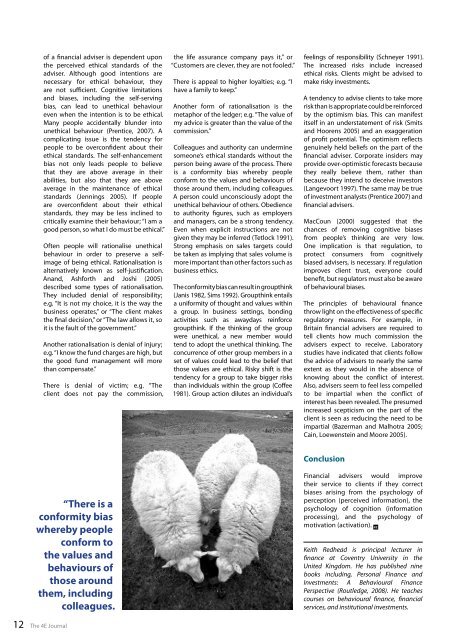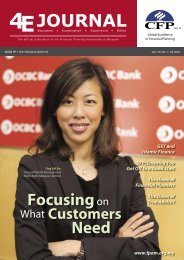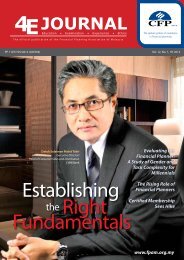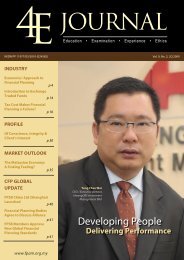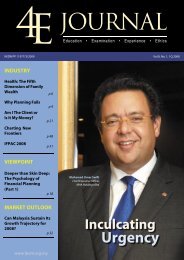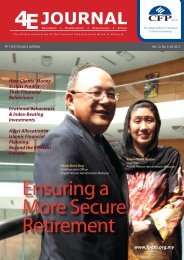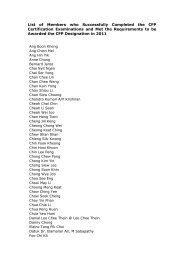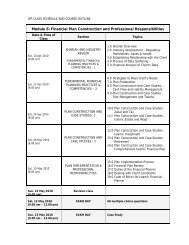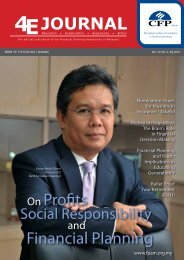Vol 10, No 4 - Financial Planning Association of Malaysia
Vol 10, No 4 - Financial Planning Association of Malaysia
Vol 10, No 4 - Financial Planning Association of Malaysia
You also want an ePaper? Increase the reach of your titles
YUMPU automatically turns print PDFs into web optimized ePapers that Google loves.
<strong>of</strong> a financial adviser is dependent upon<br />
the perceived ethical standards <strong>of</strong> the<br />
adviser. Although good intentions are<br />
necessary for ethical behaviour, they<br />
are not sufficient. Cognitive limitations<br />
and biases, including the self-serving<br />
bias, can lead to unethical behaviour<br />
even when the intention is to be ethical.<br />
Many people accidentally blunder into<br />
unethical behaviour (Prentice, 2007). A<br />
complicating issue is the tendency for<br />
people to be overconfident about their<br />
ethical standards. The self-enhancement<br />
bias not only leads people to believe<br />
that they are above average in their<br />
abilities, but also that they are above<br />
average in the maintenance <strong>of</strong> ethical<br />
standards (Jennings 2005). If people<br />
are overconfident about their ethical<br />
standards, they may be less inclined to<br />
critically examine their behaviour; “I am a<br />
good person, so what I do must be ethical.”<br />
Often people will rationalise unethical<br />
behaviour in order to preserve a selfimage<br />
<strong>of</strong> being ethical. Rationalisation is<br />
alternatively known as self-justification.<br />
Anand, Ashforth and Joshi (2005)<br />
described some types <strong>of</strong> rationalisation.<br />
They included denial <strong>of</strong> responsibility;<br />
e.g. “It is not my choice, it is the way the<br />
business operates,” or “The client makes<br />
the final decision,” or “The law allows it, so<br />
it is the fault <strong>of</strong> the government.”<br />
Another rationalisation is denial <strong>of</strong> injury;<br />
e.g. “I know the fund charges are high, but<br />
the good fund management will more<br />
than compensate.”<br />
There is denial <strong>of</strong> victim; e.g. “The<br />
client does not pay the commission,<br />
the life assurance company pays it,” or<br />
“Customers are clever, they are not fooled.”<br />
There is appeal to higher loyalties; e.g. “I<br />
have a family to keep.”<br />
Another form <strong>of</strong> rationalisation is the<br />
metaphor <strong>of</strong> the ledger; e.g. “The value <strong>of</strong><br />
my advice is greater than the value <strong>of</strong> the<br />
commission.”<br />
Colleagues and authority can undermine<br />
someone’s ethical standards without the<br />
person being aware <strong>of</strong> the process. There<br />
is a conformity bias whereby people<br />
conform to the values and behaviours <strong>of</strong><br />
those around them, including colleagues.<br />
A person could unconsciously adopt the<br />
unethical behaviour <strong>of</strong> others. Obedience<br />
to authority figures, such as employers<br />
and managers, can be a strong tendency.<br />
Even when explicit instructions are not<br />
given they may be inferred (Tetlock 1991).<br />
Strong emphasis on sales targets could<br />
be taken as implying that sales volume is<br />
more important than other factors such as<br />
business ethics.<br />
The conformity bias can result in groupthink<br />
(Janis 1982, Sims 1992). Groupthink entails<br />
a uniformity <strong>of</strong> thought and values within<br />
a group. In business settings, bonding<br />
activities such as awaydays reinforce<br />
groupthink. If the thinking <strong>of</strong> the group<br />
were unethical, a new member would<br />
tend to adopt the unethical thinking. The<br />
concurrence <strong>of</strong> other group members in a<br />
set <strong>of</strong> values could lead to the belief that<br />
those values are ethical. Risky shift is the<br />
tendency for a group to take bigger risks<br />
than individuals within the group (C<strong>of</strong>fee<br />
1981). Group action dilutes an individual’s<br />
feelings <strong>of</strong> responsibility (Schneyer 1991).<br />
The increased risks include increased<br />
ethical risks. Clients might be advised to<br />
make risky investments.<br />
A tendency to advise clients to take more<br />
risk than is appropriate could be reinforced<br />
by the optimism bias. This can manifest<br />
itself in an understatement <strong>of</strong> risk (Smits<br />
and Hoorens 2005) and an exaggeration<br />
<strong>of</strong> pr<strong>of</strong>it potential. The optimism reflects<br />
genuinely held beliefs on the part <strong>of</strong> the<br />
financial adviser. Corporate insiders may<br />
provide over-optimistic forecasts because<br />
they really believe them, rather than<br />
because they intend to deceive investors<br />
(Langevoort 1997). The same may be true<br />
<strong>of</strong> investment analysts (Prentice 2007) and<br />
financial advisers.<br />
MacCoun (2000) suggested that the<br />
chances <strong>of</strong> removing cognitive biases<br />
from people’s thinking are very low.<br />
One implication is that regulation, to<br />
protect consumers from cognitively<br />
biased advisers, is necessary. If regulation<br />
improves client trust, everyone could<br />
benefit, but regulators must also be aware<br />
<strong>of</strong> behavioural biases.<br />
The principles <strong>of</strong> behavioural finance<br />
throw light on the effectiveness <strong>of</strong> specific<br />
regulatory measures. For example, in<br />
Britain financial advisers are required to<br />
tell clients how much commission the<br />
advisers expect to receive. Laboratory<br />
studies have indicated that clients follow<br />
the advice <strong>of</strong> advisers to nearly the same<br />
extent as they would in the absence <strong>of</strong><br />
knowing about the conflict <strong>of</strong> interest.<br />
Also, advisers seem to feel less compelled<br />
to be impartial when the conflict <strong>of</strong><br />
interest has been revealed. The presumed<br />
increased scepticism on the part <strong>of</strong> the<br />
client is seen as reducing the need to be<br />
impartial (Bazerman and Malhotra 2005;<br />
Cain, Loewenstein and Moore 2005).<br />
“There is a<br />
conformity bias<br />
whereby people<br />
conform to<br />
the values and<br />
behaviours <strong>of</strong><br />
those around<br />
them, including<br />
colleagues.<br />
Conclusion<br />
<strong>Financial</strong> advisers would improve<br />
their service to clients if they correct<br />
biases arising from the psychology <strong>of</strong><br />
perception (perceived information), the<br />
psychology <strong>of</strong> cognition (information<br />
processing), and the psychology <strong>of</strong><br />
motivation (activation).<br />
Keith Redhead is principal lecturer in<br />
finance at Coventry University in the<br />
United Kingdom. He has published nine<br />
books including, Personal Finance and<br />
Investments: A Behavioural Finance<br />
Perspective (Routledge, 2008). He teaches<br />
courses on behavioural finance, financial<br />
services, and institutional investments.<br />
12 The 4E Journal


